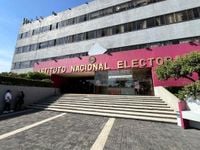On March 30, 2025, the electoral campaigns for the Poder Judicial de la Federación (PJF) officially commenced, marking a historic moment in Mexico's political landscape. This unprecedented electoral process, organized by the Instituto Nacional Electoral (INE), allows citizens to elect judges, magistrates, and ministers for the first time in Mexican history. This election, scheduled for June 1, 2025, will see over 3,400 candidates vying for 881 federal positions, including nine ministers of the Suprema Corte de Justicia de la Nación (SCJN), five magistrates of the Tribunal de Disciplina Judicial, and numerous district judges.
The campaign period will last for 60 days, concluding on May 28, 2025. During this time, candidates will be prohibited from receiving public or private financing, a rule established by Article 96 of the Constitution, which also forbids the use of radio, television, or any other paid media for promoting candidacies. Instead, candidates may utilize social media and personal resources to connect with voters, adhering to strict regulations set forth by the INE.
Senator Manuel Huerta, speaking from Veracruz, expressed his enthusiasm for the start of these campaigns, highlighting that the election is being recognized globally as a significant step towards democratizing the judiciary. "The deepest transformation we have made consists precisely in democratizing the Federal Judiciary, allowing the people to decide on all its members in the Supreme Court of Justice and the Tribunal of Discipline," he stated. He emphasized that this electoral process is a peaceful transformation that the public is eager to engage with.
For the first time, Mexican citizens will have the opportunity to choose from a diverse pool of candidates, including 64 aspirants for the nine positions within the SCJN. The election will also include five magistracies of the Tribunal de Disciplina Judicial, two magistracies of the Sala Superior del Tribunal Electoral del Poder Judicial de la Federación (TEPJF), 15 magistracies of the regional chambers of the TEPJF, 464 circuit magistracies, and 386 district judges. This represents a significant shift in Mexico's judicial system, which has traditionally been insulated from direct public influence.
The INE has established a dedicated website where citizens can learn about the candidates' backgrounds and proposals by entering their electoral district information. This initiative aims to ensure that voters are informed about whom they are electing, especially given that many candidates will not be affiliated with political parties.
The campaign rules are notably stringent. Candidates are not permitted to hold campaign events with stages or sound equipment, and they cannot engage in paid promotional activities. Instead, they can attend public forums, universities, and podcasts as long as no costs are incurred. Furthermore, while candidates can use printed materials for campaigning, they are restricted from using billboards or other large-scale advertising methods.
As the electoral process unfolds, concerns about the integrity and independence of the judiciary have emerged. Critics, including members of the opposition and various social sectors, have voiced apprehensions that the total renewal of the PJF could undermine judicial independence. They argue that judges may become susceptible to political manipulation and external pressures, particularly from organized crime.
The election follows a constitutional reform championed by former President Andrés Manuel López Obrador, who accused previous judiciary members of corruption. Current President Claudia Sheinbaum supports the reform and has described the upcoming election as a historic opportunity for the Mexican people. During a recent conference, Sheinbaum asserted, "How can it be authoritarian for the people to choose? We are a model of democracy in the world," emphasizing the significance of this electoral exercise.
Despite the enthusiasm surrounding the campaign, it has not been without its controversies. Critics have raised concerns about the electoral process's transparency, particularly regarding the selection of candidates. The INE has been under scrutiny for its budgetary constraints, which have led to fears about its ability to conduct the elections effectively. Originally, the INE requested over 13 billion pesos to organize the election but received less than half that amount, prompting discussions about how this shortfall might affect the electoral process.
In light of these challenges, the INE has implemented measures to ensure fairness and impartiality during the campaign period. The authority has prohibited public officials from promoting candidates during their official duties, aiming to maintain a level playing field for all aspirants. This prohibition extends to the President, who has been vocal about the importance of the election.
As the campaign continues, candidates will need to navigate these restrictions while effectively communicating their visions to the electorate. The stakes are high, as the outcome of this election could reshape the Mexican judiciary for generations to come. With approximately 100 million voters eligible to participate, the June 1 election represents a critical juncture for Mexico's democracy.
In conclusion, the upcoming elections for the Poder Judicial de la Federación are set to redefine the relationship between the judiciary and the public in Mexico. As the campaign progresses, all eyes will be on the candidates and how they engage with the electorate in a process that is both historic and unprecedented.







